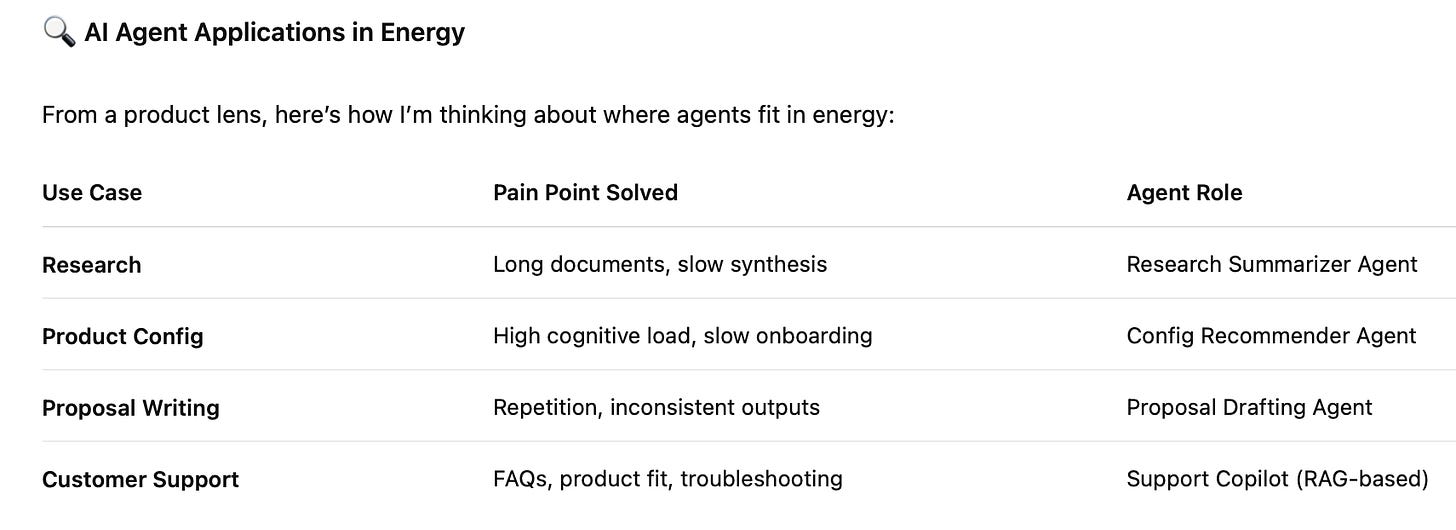Simplergy#15 I just wanted to automate energy reports. I ended up building AI agents.
How my obsession with fixing one broken workflow led to a whole new way of thinking about energy, software, and intelligent tools
Early in my career I was designing energy systems, modeling proposals, working with technical and commercial teams. But somewhere between formatting the 17th customer proposal and cross-checking incentive rules for the third time that week, I realized something: this wasn’t a knowledge problem, it was a systems problem.
Too much time was spent repeating the same tasks across teams - research, configuration, compliance checks, documentation. High-value employees were stuck doing low-leverage work.
So I asked the question every product manager eventually arrives at:
What can we automate, and what should we productize?
Identifying the pattern
Across multiple roles at different companies, I saw the same friction:
Sales engineers onboarding slowly because of complex product configuration rules
Technical teams acting as live helpdesks for tools and policies
Proposal teams bogged down by formatting and compliance
Repeated “last mile” work in research, analysis, and customer response
The real issue wasn’t talent or effort, it was cognitive overload and lack of structured support. And that’s when I became interested in AI agents - not as a trend, but as a way to reduce friction and unlock focus. In a recent event, one of the investor said you should be building tools that are needed both my businesses and employers as “Professionals
So… What is an AI Agent?
An AI agent isn’t just ChatGPT with a fancy prompt. It’s like hiring an intern who actually knows what they’re doing, remembers what you told them last week, uses the right tools, and always gives you a neat summary at the end.
You give it a goal, and it figures out the steps.
You give it a role, and it sticks to its job.
You give it tools, and it uses them like a pro.
It’s not just AI. It’s AI with purpose.
Why we need agents in the new energy landscape..
If you’ve ever worked as a Sales or Applications Engineer, you know the pain. You’re expected to juggle technical details, business cases, regulatory jargon, customer calls, and internal tools all at once.
It took me three months in my first job just to wrap my head around our product configuration logic and few more to perfect the craft. I remember thinking:
“Why isn’t there a digital assistant that just knows all of this?”
One that can:
Answer technical questions
Recommend the right battery or inverter
Draft the first version of a proposal
Explain incentives or interconnection rules in simple and plain English
That’s exactly the kind of AI agent I want to build.
Began my journey exploring and learning following tools:
Right now, I’m exploring a bunch of tools that make this possible:
Langchain – For building multi-step agents that can reason and plan
Notion AI – For fast internal research and summarizing long docs
Zapier + ChatGPT – For stitching together APIs and automating workflows
Streamlit – To turn Python scripts into apps you can actually use
Lovable - Turning ideas into mockup
I even mocked up a agent using Lovable (shoutout to the no-code dreamers out there):
https://energy-ai-assist.lovable.app
(Yes, I made this without a designer. Yes, I’m proud.)
Designing an Agent
Here’s the mental model I used when crafting an agent:
Role: Who are you? What’s your function?
Constraints: What can’t you do? Budget, accuracy,?
Tools: What APIs, calculators, or documents can you access?
Memory: Can you remember user preferences or past context?
Goal: What’s your north star for this interaction?
When these are clear, the agent becomes less of a chatbot and more of a digital teammate.
What I’m building next
I’m exploring agents that act like:
A product configurator that takes site data and outputs a technical stack
A proposal generator that adapts to local policies and customer profiles, and easy to understand
A customer support assistant that can answer 80% of FAQs instantly
A research agent that pulls insights from documents, not just the web
But most of all, I’m trying to build something useful. Something that earns time back for people doing real, hard work.
One last thought
I didn’t plan to get into AI. But like a lot of people with engineering brain and product heart, I just couldn’t unsee the inefficiencies anymore. So I started building. If you’re exploring similar ideas - whether you’re hacking Zapier flows or building full-blown agent stacks - hit me up. Let’s debug the energy industry together.




